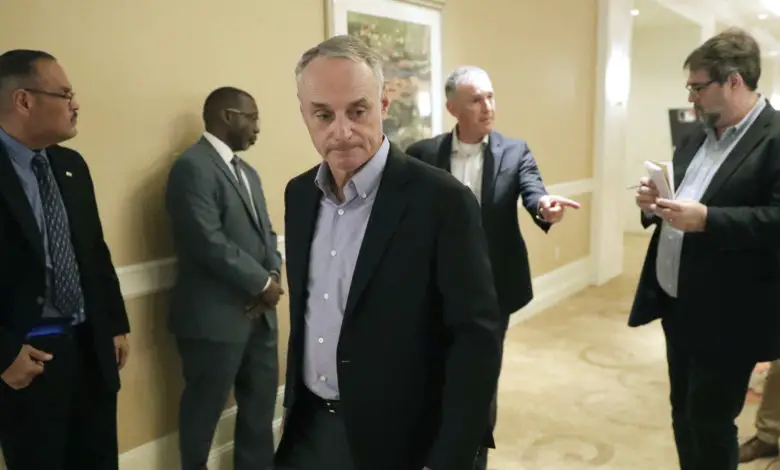
Unresolved Issues with Player Pay Could Impact MLB’s Potential Return
Rob Manfred is confident in playing some sort of 2020 season, telling staffers “I fully anticipate baseball will return this season.” Discussions of various iterations of a reboot plan have been made public, ranging from playing in one or more American hubs to opening the season in the Dominican Republic or even Japan. The MLB Players Association would have to grant approval for any structure and subsequent schedule, but an early agreement on pay and service time seemed to pave the way for a broader pact once play becomes a reality.
Except that the whole matter of pay might be very much up in the air yet.
It was reported Monday that Manfred would suspend Uniform Employee Contracts as of May 1 in order to allow teams more flexibility when it comes to furloughs or reductions in pay. Most teams, including the Cubs, have pledged to pay their employees through the end of May, but the void of certainty makes financial decisions very difficult. That’s particularly true when it comes to player salaries, which are apparently not nearly as settled as once thought.
Since paychecks are only issued during the regular season, MLB agreed to a deal with the union to pay a $170 million salary advance to players that covers the first two months of the season. Players will get nothing more if the season is canceled, but they agreed not to sue for lost wages in exchange for being granted full service time. However, the two sides are currently at odds when it comes to how salaries will work if there are games.
Players believe their agreement calls for them to receive pro-rated portions of salary based on the number of games played, period. Owners believe the pact allows for them to further reduce pay as a function of empty stadiums and decreased revenue. As ownership’s argument goes, it would actually be more costly to play without fans than to not play at all, so players should be forced willing to accept lower pay.
What we’re left with is that both sides are saying the exact same thing and interpreting it in different ways.
“Right now, we are having a debate over what the word ‘clear’ means,” Josh Knipp, president and co-founder of KHG Sports Management, told CI’s The Rant Live on Monday. “In the last couple days, Tony Clark from the PA said, ‘It is clear that this agreement addresses if we play games without fans.’ And then two days later, Rob Manfred comes out and goes, ‘Yes, it is clear this agreement addresses if we play without fans.’
“Now somehow those results are completely different. Manfred says that means the players will need to give more money back. Tony Clark says absolutely not, we did not address this and they do not need to give any money back. Why don’t we see the agreement, guys?”
While everyone will tout baseball’s return as a good thing for the sport and even the nation as a whole, understandably so, it’s important to understand that money is ultimately at the core of any decisions here. Just how entrenched each side is in its respective position isn’t clear and may not be for some time, but it’s not beyond imagination to see some of these sticking points hampering plans for the future even beyond the more pressing health and safety issues.
Further clouding these matters is the overall labor unrest that has been building in advance of the current collective bargaining agreement at the conclusion of the 2021 season. Neither side wants to make concessions that far in advance of broader negotiations, which could create even more contentious discussions when it comes to 2020 salaries.
There’s still plenty of time to work this out in time for whatever semblance of a season MLB may be able to scrape together, but there’s potential for things to get really ugly and stay that way for quite a while.

